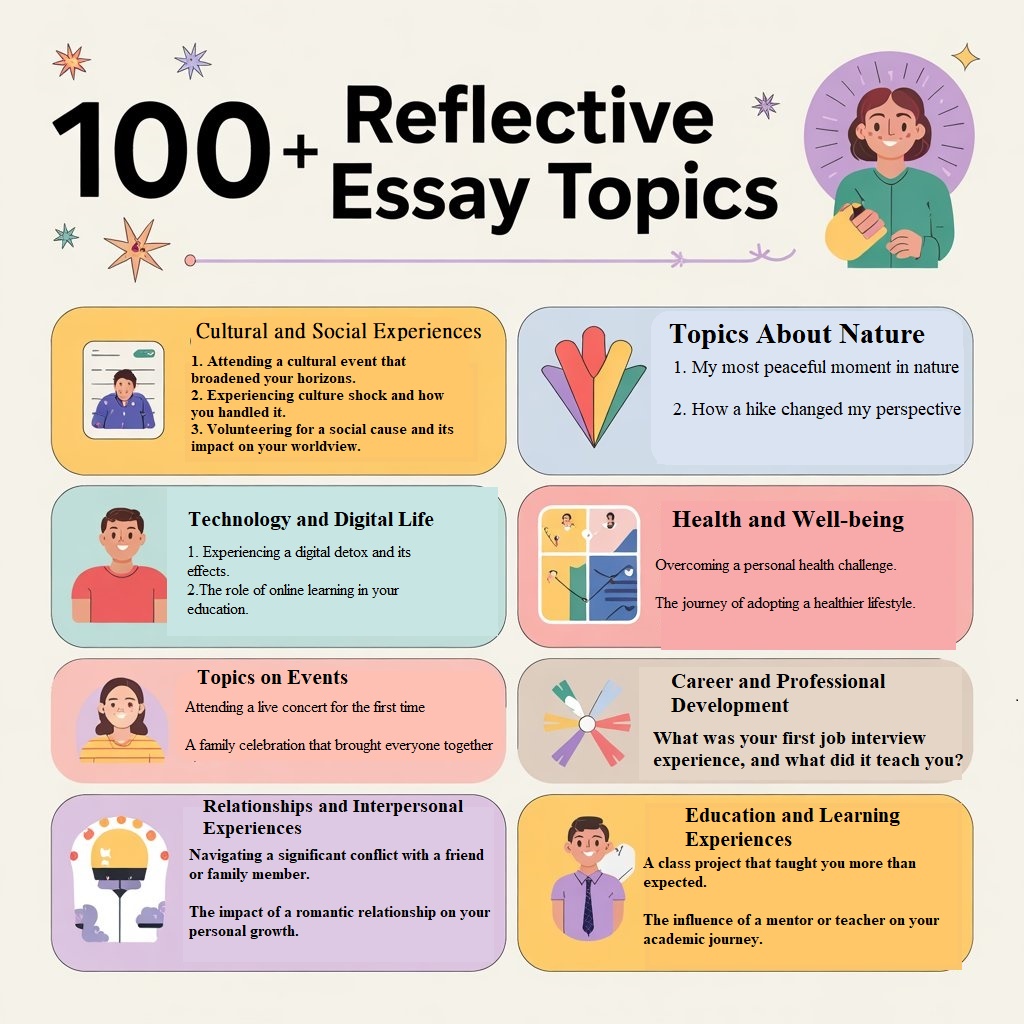Reflective essays offer a unique opportunity for introspection, personal growth, and critical thinking. They allow individuals to explore personal experiences, ethical dilemmas, and societal influences, turning everyday moments into meaningful narratives.
With numerous topics available, the scope for self-reflection is vast and engaging. Whether analyzing a life-changing event, a moral conflict, or the impact of technology on personal identity, reflective essays help writers make sense of their past and draw lessons for the future.
Exploring over 100 reflective essay topics while providing expert-backed strategies can help select the best topic for writing.
How to Choose a Strong Reflective Essay Topic
1. Think Personal but Universal
When choosing a reflective essay topic, starting with something personal—an experience that genuinely impacted you is important. However, it must also carry a universal message or lesson that others can relate to. The best topics allow your readers to connect with your emotions and see reflections of their own lives in your story. For example, writing about a moment of fear, doubt, or joy can resonate with people from all backgrounds, even if the circumstances differ. Rather than focusing on surface details, dig into the feelings and insights from the experience. A topic like “Getting Lost in a Foreign Country” might not seem deeply meaningful at first. Still, when reframed as “How Getting Lost Taught Me Independence,” it becomes something others can relate to on an emotional level.
2. Focus on Growth, Change, or Realization
A powerful reflective essay usually involves some kind of personal transformation. You want to show how a particular experience helped you grow, changed your perspective, or revealed something important about yourself or others. Readers are drawn to stories of change because they mirror the personal journeys we all go through. Reflect on times when your beliefs were challenged, you had to make a difficult decision, or something clicked for you in a way it never had before. Even small moments like a conversation with a stranger or a single day at work can be profound if they lead to internal growth. The key is not the size of the event but the depth of the insight it offers.
3. Dig Into Emotional Moments
Emotion is the heart of any good reflective essay. Choose a topic that stirred real heartbreak, joy, embarrassment, anxiety, pride, or something else. These emotional moments are where readers connect with you most. When you write with emotional honesty, your audience becomes invested in your experience. It’s okay to be vulnerable; it’s often what makes a reflective essay truly powerful. Think about when you were emotionally moved—what happened, how did you feel, and what did you learn? A topic like “How My First Public Speech Made Me Cry (and Why I’m Glad It Did)” immediately suggests a strong emotional arc and an opportunity for reflection.
4. Avoid Clichés and Surface-Level Topics
While certain themes like school, sports, or family are common in reflective writing, be careful not to fall into cliché territory. A generic recount of “winning a game” or “graduating from school” may not offer much depth unless you put a fresh, personal spin on it. Instead of retelling an event that’s been written about a hundred times, ask yourself what truly unique angle you can offer. Maybe losing that game taught you about teamwork, or maybe graduating didn’t feel as fulfilling as you expected. Don’t be afraid to subvert expectations or write about a less obvious, more nuanced moment. The more honest and original your perspective, the more your essay will stand out.
5. Be Specific, Not Broad
One common mistake in reflective writing is choosing a too broad topic. Your reflections can become vague and unfocused if your subject is too general. Instead, zero in on one specific event, conversation, or turning point. For example, rather than writing about “my time in high school,” you could focus on “the day I stood up to a teacher for the first time.” Narrowing your focus allows you to explore that moment deeply, providing vivid detail and meaningful reflection. Specificity brings clarity and helps your essay become more impactful and memorable.
Check on this Rhetorical Analysis Essay Writing









 Evan John
Evan John